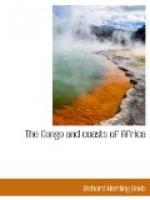He threw out his hands at the gas-lamps, rapidly he pointed at each of them in turn.
“Voila, Boma!” he said.
From Boma we steamed six hours farther up the river to Matadi. On the way we stopped at Noqui, the home of Portuguese traders on the Portuguese bank, which, as one goes up-stream, lies to starboard. Here the current runs at from four to five miles an hour, and has so sharply cut away the bank that we are able to run as near to it with the stern of our big ship as though she were a canoe. To one used more to ocean than to Congo traffic it was somewhat bewildering to see the five-thousand-ton steamer make fast to a tree, a sand-bank looming up three fathoms off her quarter, and the blades of her propeller, as though they were the knives of a lawn-mower, cutting the eel-grass.
At Matadi the Congo makes one of her lightning changes. Her banks, which have been low and woody, with, on the Portuguese side, glimpses of boundless plateaux, become towering hills of rock. At Matadi the cataracts and rapids begin, and for two hundred miles continue to Stanley Pool, which is the beginning of the Upper Congo. Leopoldville is situated on Stanley Pool, just to the right of where the rapids start their race to the south. With Leopoldville above and Boma below, still nearer the mouth of the river, Matadi makes a centre link in the chain of the three important towns of the Lower Congo.
When Henry M. Stanley was halted by the cataracts and forced to leave the river he disembarked his expedition on the bank opposite Matadi, and a mile farther up-stream. It was from this point he dragged and hauled his boats, until he again reached smooth water at Stanley Pool. The wagons on which he carried the boats still can be seen lying on the bank, broken and rusty. Like the sight of old gun carriages and dismantled cannon, they give one a distinct thrill. Now, on the bank opposite from where they lie, the railroad runs from Matadi to Leopoldville.
The Congo forces upon one a great admiration for Stanley. Unless civilization utterly alters it, it must always be a monument to his courage, and as you travel farther and see the difficulties placed in his way, your admiration increases. There are men here who make little of what Stanley accomplished; but they are men who seldom leave their own compound, and, who, when they do go up the river, travel at ease, not in a canoe, or on foot through the jungle, but in the smoking-room of the steamer and in a first-class railroad carriage. That they are able so to travel is due to the man they would belittle. The nickname given to Stanley by the natives is to-day the nickname of the government. Matadi means rock. When Stanley reached the town of Matadi, which is surrounded entirely by rock, he began with dynamite to blast roads for his caravan. The natives called him Bula Matadi, the Breaker of Rocks, and, as in those days he was the Government, the Law, and the Prophets, Bula Matadi, who then was the white man who governed, now signifies the white man’s government. But it is a very different government, and a very different white man. With the natives the word is universal. They say “Bula Matadi wood post.” “Not traders’ chop, Bula Matadi’s chop.” “Him no missionary steamer, him Bula Matadi steamer.”




